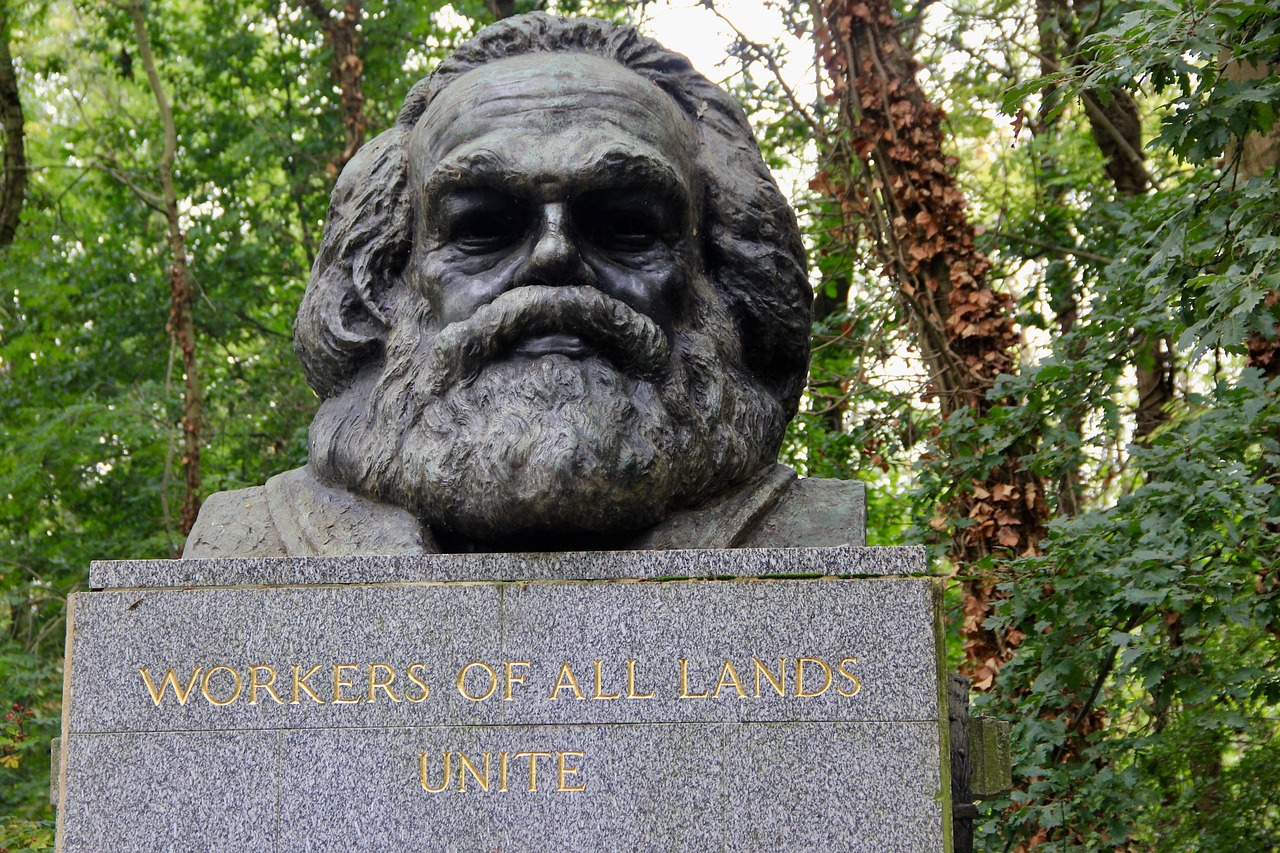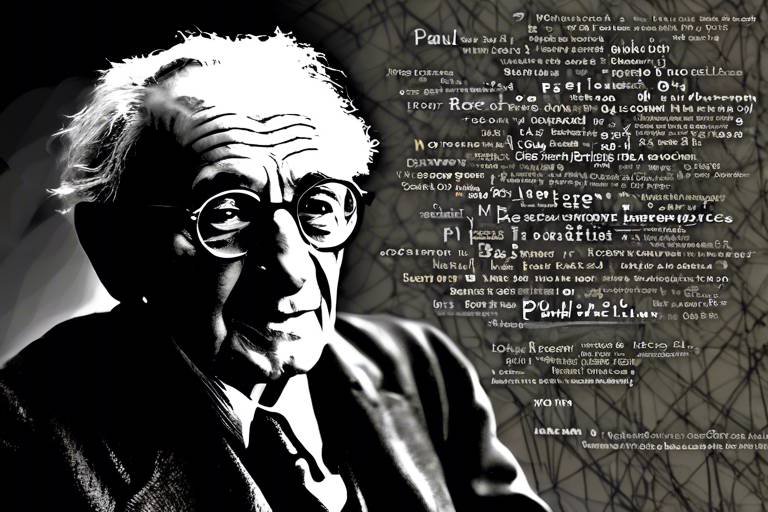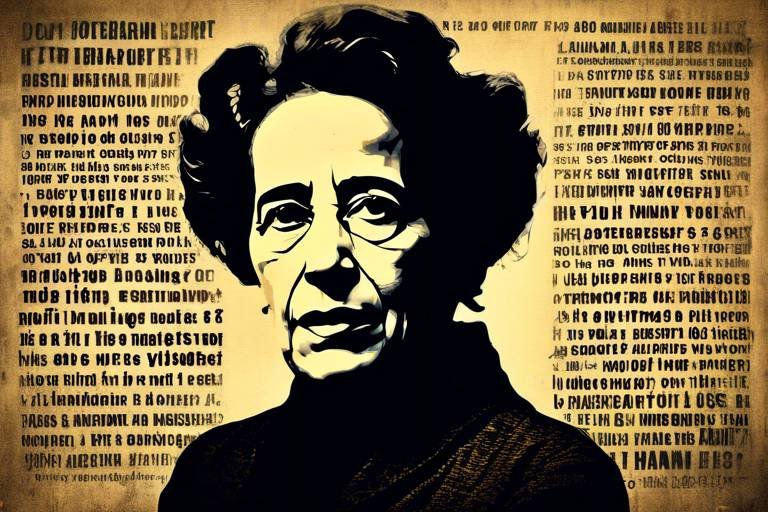Understanding Friedrich Engels’s Contribution to Marxist Philosophy
Friedrich Engels stands as a towering figure in the realm of Marxist philosophy, a beacon of insight and revolutionary thought. His partnership with Karl Marx was not merely a collaboration; it was the spark that ignited a firestorm of political and social change that reverberates to this day. Together, they crafted ideas that challenged the status quo, offering a new lens through which to view the world. Engels’s contributions go beyond his joint works with Marx; they encompass a wealth of independent writings that delve into the complexities of society, economics, and politics.
Engels's role in shaping Marxist theory is often overshadowed by Marx's more prominent status, yet his influence is undeniable. He was not just a supporter; he was a co-architect of a revolutionary ideology that sought to empower the working class. Through his writings, Engels articulated the principles of socialism in a way that was accessible and compelling, making the abstract concepts of Marxist thought tangible for the masses. His ability to communicate complex ideas in a relatable manner is one of the reasons why his work has endured the test of time.
One of the most significant aspects of Engels's contribution to Marxist philosophy is his emphasis on class struggle. He understood that the conflicts between different social classes were not merely incidental but rather central to the development of human society. This idea is encapsulated in the famous phrase from The Communist Manifesto: "The history of all hitherto existing society is the history of class struggles." Engels's insights into the dynamics of class relations laid the groundwork for future analyses of social inequality and injustice.
Moreover, Engels's exploration of dialectical materialism provided a robust framework for understanding the interplay between material conditions and societal evolution. He posited that material realities shape human consciousness and societal structures, a concept that has become a cornerstone of Marxist thought. This approach not only informs political theory but also serves as a critical tool for analyzing historical events and social transformations.
Engels's legacy is evident in contemporary discussions surrounding socialism and economic justice. His ideas continue to inspire activists and scholars alike, encouraging a reevaluation of the capitalist system and its implications for the working class. As we navigate the complexities of modern society, Engels's insights remind us of the importance of solidarity, collective action, and the relentless pursuit of equality.
- What is Friedrich Engels known for?
Engels is best known for his collaboration with Karl Marx in developing Marxist theory, particularly through works like The Communist Manifesto. - How did Engels contribute to Marxist philosophy?
He contributed through his writings on dialectical materialism, class struggle, and the critique of capitalism, enhancing the theoretical framework of socialism. - Why is The Communist Manifesto significant?
The Communist Manifesto is significant because it outlines the principles of communism and critiques capitalist society, serving as a rallying call for workers worldwide. - What is dialectical materialism?
Dialectical materialism is a philosophical approach that emphasizes the importance of material conditions in shaping societal development and understanding historical progress. - How does Engels's work influence modern socialism?
Engels's ideas on class struggle and economic systems continue to inform contemporary discussions about equity and reform in society.

Engels and Marx: The Dynamic Duo
Friedrich Engels and Karl Marx formed a powerful intellectual partnership that revolutionized political thought. Their collaboration was not just a meeting of minds; it was a dynamic synergy that sparked a movement. Imagine two brilliant musicians coming together to create a symphony that resonates through time—this is what Engels and Marx achieved in the realm of socialist theory. They combined their insights into economics, politics, and society, crafting a narrative that challenged the status quo and inspired generations.
Their relationship was rooted in a shared vision of a just society, where the struggles of the working class were at the forefront. Engels, often seen as the more practical of the two, brought a wealth of experience from his own life in the industrial world. Meanwhile, Marx's theoretical prowess provided the philosophical backbone necessary for their ideas to flourish. Together, they tackled complex issues like class struggle, economic exploitation, and the need for revolutionary change. Their discussions were often intense, filled with passion and urgency, as they sought to understand the world around them and find solutions to its injustices.
One of the most significant outcomes of their collaboration was the development of key texts that laid the foundation for modern socialism. Among these was The Communist Manifesto, a rallying cry for the oppressed that articulated the principles of communism. This document was not merely an academic treatise; it was a call to action, urging workers to recognize their collective power and unite against their oppressors. The manifesto's famous opening lines, "A spectre is haunting Europe—the spectre of communism," encapsulate the urgency and revolutionary spirit of their ideas.
Engels's contributions were not limited to his partnership with Marx. He also authored several important works that expanded on their shared theories. For instance, his book Socialism: Utopian and Scientific provides a clear exposition of their ideas, distinguishing between the idealistic visions of earlier socialists and their scientific approach to socialism. This distinction is crucial, as it underlines the importance of empirical evidence and material conditions in shaping societal change.
In essence, the collaboration between Engels and Marx was a perfect blend of theory and practice. Their dialogues were not just academic; they were deeply personal and politically charged, reflecting the tumultuous times in which they lived. Together, they forged a legacy that continues to influence political movements and discussions about social justice around the globe. Their partnership reminds us that great ideas often emerge from collaboration, and that the fight for equity is a collective endeavor.

The Role of The Communist Manifesto
Published in 1848, The Communist Manifesto stands as a pivotal document in the history of political thought, co-authored by the brilliant minds of Friedrich Engels and Karl Marx. This manifesto is not just a political pamphlet; it is a clarion call for the oppressed, a roadmap for revolutionary change, and a critique of the capitalist system that dominates society. The manifesto outlines the principles of communism and presents a scathing critique of capitalist society, making it a cornerstone for socialist movements around the globe. Its famous opening line, "A spectre is haunting Europe—the spectre of communism," immediately grabs attention, setting the stage for a passionate discussion on class struggle and the need for societal transformation.
The historical context in which The Communist Manifesto emerged is essential for understanding its significance. The mid-19th century was marked by social upheaval, economic crises, and a growing awareness of the plight of the working class. Industrialization had transformed economies, but it also led to the exploitation of labor, poor working conditions, and vast inequalities. This backdrop of turmoil and discontent provided fertile ground for Engels and Marx to articulate their revolutionary ideas. The manifesto served not only as a critique of the existing capitalist order but also as a rallying cry for workers to unite and fight for their rights.
To grasp the full impact of The Communist Manifesto, one must consider the historical events leading up to its publication. The revolutions of 1848, often referred to as the "Springtime of Nations," saw widespread political upheaval across Europe. Workers were rising up against oppressive regimes, demanding better conditions, political representation, and social justice. In this climate of unrest, the manifesto's call for solidarity among the proletariat resonated deeply. It highlighted the necessity for the working class to band together, transcending national boundaries in their struggle against exploitation.
The impact of The Communist Manifesto on labor movements cannot be overstated. It galvanized workers across Europe and beyond, inspiring them to unite against the forces of exploitation and inequality. The manifesto's assertion that "the history of all hitherto existing society is the history of class struggles" became a foundational idea for labor organizations. As workers began to organize strikes and form unions, the manifesto provided a theoretical framework that justified their actions and aspirations. Its enduring relevance in contemporary discussions about workers' rights and social justice underscores the manifesto's lasting legacy.
Engels and Marx's critique of capitalism in the manifesto is sharp and incisive. They argue that capitalism is not just an economic system; it is a social order that perpetuates inequality and class struggle. The manifesto outlines how capitalism leads to the alienation of the worker, as individuals become mere cogs in the machinery of production. This critique remains relevant today, as modern socio-economic debates continue to grapple with issues of wealth inequality, corporate power, and the exploitation of labor. By exposing the inherent contradictions within capitalism, Engels and Marx laid the groundwork for future critiques of the system, influencing generations of thinkers and activists.
In conclusion, The Communist Manifesto is more than just a historical document; it is a living text that continues to inspire and provoke thought. Its powerful messages about class struggle, solidarity, and the critique of capitalism resonate with ongoing social movements. As we navigate the complexities of modern society, the manifesto serves as a reminder of the enduring fight for justice and equality.
- What is the main message of The Communist Manifesto?
The main message is the call for the working class to unite against capitalist exploitation and fight for their rights. - Who co-authored The Communist Manifesto?
Friedrich Engels and Karl Marx co-authored the manifesto. - How did The Communist Manifesto influence labor movements?
It inspired workers to organize and fight for better conditions and rights, serving as a theoretical basis for labor activism. - Why is The Communist Manifesto still relevant today?
Its critiques of capitalism and calls for social justice resonate with ongoing struggles against inequality and exploitation.

Historical Context of the Manifesto
To truly grasp the significance of The Communist Manifesto, one must delve into the historical context in which it was born. The year was 1848, a time marked by widespread social unrest and revolutionary fervor across Europe. The Industrial Revolution had transformed economies and societies, leading to a stark divide between the wealthy bourgeoisie and the impoverished proletariat. This period was characterized by the rise of factories, urbanization, and a growing discontent among workers who faced grueling labor conditions, long hours, and meager wages.
In the backdrop of this turmoil, Europe was witnessing a series of revolutions and uprisings, such as the February Revolution in France, which aimed to overthrow the monarchy and establish a republic. These events created an atmosphere ripe for radical ideas and political change. Engels and Marx recognized the urgency of the moment, seeing it as an opportunity to present their revolutionary ideas to the masses. Their manifesto was not just a theoretical text; it was a clarion call for the working class to rise against their oppressors.
Moreover, the manifesto emerged from the influence of earlier socialist thinkers and movements, which had laid the groundwork for a collective response to capitalism. The ideas of figures like Henri de Saint-Simon, Charles Fourier, and Robert Owen can be seen as precursors to the manifesto's arguments. Engels and Marx synthesized these thoughts, giving them a rigorous philosophical framework that emphasized class struggle as the engine of historical progress.
As the manifesto spread its revolutionary message, it resonated with various social groups, including labor unions, intellectuals, and those disillusioned with the existing political order. The call to action in the manifesto was not merely theoretical; it was a response to the tangible experiences of the working class. The famous opening line, "A specter is haunting Europe—the specter of communism," encapsulates the urgency and the revolutionary spirit of the time. It signified that the working class was awakening to its potential power, ready to challenge the status quo.
In summary, the historical context of The Communist Manifesto reveals a world on the brink of transformation. The convergence of industrialization, class struggle, and revolutionary zeal provided the fertile ground for Engels and Marx's ideas to take root. Their work not only reflected the struggles of their time but also aimed to ignite a movement that would seek to reshape society fundamentally.
- What was the main goal of The Communist Manifesto?
The primary goal of The Communist Manifesto was to advocate for the rights of the working class and to call for a revolution against the capitalist system. - How did The Communist Manifesto influence labor movements?
The manifesto inspired labor movements by encouraging workers to unite and fight against exploitation, emphasizing the importance of solidarity among the proletariat. - What is dialectical materialism?
Dialectical materialism is a philosophical approach developed by Engels and Marx that emphasizes the role of material conditions in shaping society and historical progress through contradictions and their resolutions. - Why is Engels considered an important figure in Marxist philosophy?
Engels is considered crucial because he not only collaborated with Marx but also produced significant independent works that expanded and clarified Marxist theory, particularly in areas like dialectical materialism and the role of the state.

Influence on Labor Movements
The impact of The Communist Manifesto on labor movements cannot be overstated. When Engels and Marx penned this revolutionary text, it was like throwing a match into a powder keg of social unrest. The manifesto not only articulated the plight of the working class but also ignited a sense of solidarity among workers across Europe and beyond. It was as if they had given a voice to the voiceless, empowering them to rise against the oppressive structures that had long kept them in chains.
In the decades following its publication, workers began to organize themselves into unions and political parties, inspired by the call to unite against their capitalist oppressors. The manifesto's famous rallying cry, "Workers of the world, unite!" became a slogan for countless labor movements, serving as a reminder that their struggles were interconnected. These movements sought not only better wages and working conditions but also the fundamental restructuring of society to prioritize the needs of the working class over the profits of the elite.
Engels's influence extended beyond just the manifesto. He actively participated in various labor organizations and movements, advocating for the rights of workers. His writings on the conditions of the working class, such as in The Condition of the Working Class in England, provided a detailed account of the harsh realities faced by laborers, further galvanizing support for workers' rights. This work is often regarded as one of the earliest sociological studies, shedding light on the dire circumstances that demanded change.
As labor movements gained momentum, they began to adopt some of the key tenets of Marxist philosophy, including the importance of class struggle and the need for collective action. The establishment of socialist parties in various countries during the late 19th and early 20th centuries can be traced back to the ideas propagated by Engels and Marx. These parties became instrumental in advocating for labor rights, leading to significant reforms such as:
- Establishment of the eight-hour workday
- Implementation of child labor laws
- Formation of health and safety regulations in the workplace
Moreover, the influence of Engels's ideas on labor movements can be seen in the international labor conferences that emerged in the late 19th century. These gatherings brought together workers from different nations, fostering a sense of global solidarity and shared purpose. The International Workers' Association, commonly known as the First International, was a direct result of this growing consciousness among workers worldwide. Engels played a crucial role in this organization, emphasizing the need for a united front against capitalist exploitation.
Today, the legacy of Engels and Marx continues to resonate within modern labor movements. Their emphasis on solidarity and collective action remains relevant as workers confront new challenges in the gig economy and globalized labor markets. As we navigate the complexities of contemporary society, the principles laid out by Engels serve as a guiding light, reminding us that the fight for workers' rights is far from over.
- What was the main message of The Communist Manifesto?
The main message of The Communist Manifesto was to call for the unification of the working class to overthrow capitalist systems and establish a society where the means of production are collectively owned.
- How did Engels contribute to Marxist philosophy?
Engels contributed to Marxist philosophy through his writings on dialectical materialism, the role of the state, and by co-authoring significant works with Marx, including The Communist Manifesto.
- What is dialectical materialism?
Dialectical materialism is a philosophical approach that emphasizes the importance of material conditions in understanding societal development and historical change, focusing on contradictions and their resolutions.

Critique of Capitalism
The critique of capitalism presented by Friedrich Engels and Karl Marx in The Communist Manifesto is not just a theoretical exercise; it serves as a profound analysis of the economic system that governs much of the modern world. Their argument centers around the idea that capitalism is inherently flawed, leading to systemic inequalities and class struggles that affect the majority of the population. They assert that capitalism prioritizes profit over people, creating a society where the rich get richer while the poor remain trapped in a cycle of exploitation.
Engels and Marx highlight several key issues within capitalist systems:
- Class Struggle: They argue that capitalism creates a division between the bourgeoisie (the capitalist class) and the proletariat (the working class). This division leads to ongoing conflict, as the interests of the two classes are fundamentally opposed.
- Alienation: Workers are alienated from the products of their labor, the labor process itself, and their fellow workers. This alienation diminishes their humanity and sense of fulfillment.
- Exploitation: The capitalist system thrives on the exploitation of workers, where the value produced by labor is appropriated by capitalists, leading to vast wealth disparities.
Engels's critique doesn't stop at merely identifying problems; he also delves into the consequences of these issues. He argues that as capitalism progresses, it becomes increasingly unstable, leading to economic crises that can devastate entire societies. The cycle of boom and bust is a hallmark of capitalist economies, creating uncertainty and hardship for the working class. This instability is not just an economic concern; it also has social and political ramifications, as disillusioned citizens may turn to radical movements in search of change.
Furthermore, Engels and Marx contend that capitalism undermines social cohesion. By fostering competition over cooperation, it erodes community bonds, making individuals more isolated and self-interested. This perspective is particularly relevant today, as we witness growing social divisions and a decline in communal values. The push for individual success often comes at the expense of collective well-being, leading to a fragmented society.
In addition to these critiques, Engels also emphasizes the environmental degradation that can arise from unchecked capitalist expansion. The relentless pursuit of profit often leads to the exploitation of natural resources without regard for sustainability. This aspect of their critique is increasingly important in our current context, where climate change poses a significant threat to global stability.
Overall, Engels and Marx's critique of capitalism remains a powerful framework for understanding the challenges we face in modern society. Their insights encourage us to question the status quo and consider alternative economic systems that prioritize human welfare over profit. As we navigate the complexities of contemporary capitalism, their ideas serve as a reminder of the need for systemic change to address the inequalities and injustices that persist.
- What is the main argument of Engels and Marx against capitalism?
The main argument is that capitalism creates inherent inequalities and class struggles, prioritizing profit over people and leading to exploitation and alienation of workers. - How does capitalism lead to social instability?
Capitalism leads to economic crises and social divisions, as the interests of the bourgeoisie and proletariat conflict, which can result in radical movements seeking change. - What relevance do Engels and Marx's critiques have today?
Their critiques remain relevant as they address ongoing issues such as wealth inequality, environmental degradation, and the need for systemic change in our economic systems.

Engels's Independent Works
Friedrich Engels was not just Karl Marx's collaborator; he was a formidable thinker in his own right. His independent works significantly enriched the landscape of Marxist philosophy, providing a deeper understanding of various socio-economic issues. One of his most notable contributions is the concept of dialectical materialism, which he articulated in his writings, emphasizing the interplay between material conditions and societal development. Engels argued that to comprehend history and society, one must focus on the material realities of life, such as economic relationships and class struggles.
In addition to dialectical materialism, Engels wrote extensively on the role of the state in society. He believed that the state is not a neutral entity but rather an instrument of class oppression. In his book, The Origin of the Family, Private Property and the State, he explored the evolution of social structures and how they are influenced by economic conditions. This work is pivotal in understanding how family dynamics and property relations have changed over time, reflecting broader societal shifts.
Engels's exploration of class struggle is another significant aspect of his independent works. He argued that history is fundamentally a history of class struggles, where the oppressed rise against their oppressors. His writings delve into the dynamics of class conflict, illustrating how economic systems shape social relations and political power. This theme resonates strongly in modern discussions about inequality and social justice, making Engels's insights more relevant than ever.
Moreover, Engels's ability to communicate complex ideas in a relatable manner sets his works apart. He often used vivid examples and analogies to explain his theories, making them accessible to a broader audience. For instance, he compared the evolution of society to the natural world, arguing that just as species evolve through adaptation and conflict, so too do social systems undergo transformation through struggle and contradiction.
Overall, Engels's independent works not only complement Marx's theories but also stand as significant contributions to political philosophy. They continue to inspire scholars and activists alike, urging them to consider the material conditions that underpin social realities. As we navigate contemporary issues of inequality and oppression, Engels's insights remind us that understanding the past is crucial for forging a more equitable future.
- What is dialectical materialism?
Dialectical materialism is a philosophical approach that emphasizes the importance of material conditions in shaping societal development and understanding historical progress through contradictions and their resolutions. - How did Engels influence socialist thought?
Engels's writings expanded the theoretical framework of socialism, particularly through his discussions on class struggle, the role of the state, and the dynamics of economic systems. - What are some of Engels's notable works?
Some of Engels's significant works include The Origin of the Family, Private Property and the State and Anti-Dühring, which delve into various aspects of society and economics. - Why is Engels's work still relevant today?
Engels's insights into class struggle, economic systems, and social justice continue to resonate in contemporary discussions about equity, labor rights, and societal reform.

Dialectical Materialism Explained
Dialectical materialism is not just a philosophical concept; it's a transformative lens through which we can understand the complexities of societal development. Developed primarily by Friedrich Engels, this theory serves as a foundational pillar of Marxist philosophy. At its core, dialectical materialism emphasizes the role of material conditions—such as economic structures and class relations—in shaping human society and historical progress. Engels posited that rather than ideas or ideals driving historical change, it is the material conditions of life that dictate the evolution of human societies.
Engels' approach is rooted in the dialectical method, which he borrowed and adapted from Hegelian philosophy. However, he flipped Hegel’s idealism on its head, arguing that material reality is the primary driver of change. This means that contradictions within society—like those between different economic classes—create tensions that lead to social transformation. For example, the conflict between the bourgeoisie (the capitalist class) and the proletariat (the working class) is a central contradiction in capitalist societies, driving the struggle for workers' rights and social justice.
To better understand dialectical materialism, consider the following key components:
- Material Conditions: The economic base of society, including the means of production and the relationships between different classes.
- Contradictions: The inherent conflicts within society that arise from differing interests, such as those between employers and employees.
- Change through Conflict: Social progress occurs through the resolution of these contradictions, often through revolutionary means.
This framework not only provides insights into historical events but also serves as a guide for analyzing contemporary issues. For instance, by applying dialectical materialism, one can scrutinize the ongoing debates surrounding income inequality, examining how economic structures perpetuate class divisions and influence social policies. Engels believed that understanding these dynamics was crucial for any movement seeking to achieve social change.
However, the application of dialectical materialism has not been without its challenges. Critics argue that it can be overly deterministic, suggesting that material conditions alone dictate human behavior and societal outcomes. Yet, proponents maintain that while material conditions are significant, they interact with human agency and consciousness, creating a more nuanced understanding of societal evolution.
In summary, dialectical materialism is a powerful tool for analyzing both historical and contemporary social issues. It encourages us to look beyond surface-level phenomena and delve into the underlying economic and social structures that shape our world. By doing so, we can better understand the forces at play in our lives and the potential for transformative change.
- What is the main idea of dialectical materialism? It posits that material conditions and economic structures primarily drive societal change, rather than ideas or ideals.
- How does dialectical materialism apply to modern society? It helps analyze issues like class struggle, economic inequality, and social justice by focusing on the material conditions that shape these phenomena.
- Why is dialectical materialism important in Marxist philosophy? It provides a framework for understanding historical progress and social transformations through the lens of class relations and contradictions.

Application in Historical Analysis
Dialectical materialism, as articulated by Friedrich Engels, serves as a powerful tool for understanding the complexities of historical events and societal transformations. This framework posits that the material conditions of life, including economic factors, play a crucial role in shaping human society and its development. By focusing on the interactions between different social classes and the contradictions that arise from these interactions, dialectical materialism allows us to analyze history not as a series of isolated incidents but as a dynamic process influenced by underlying economic structures.
For instance, consider the rise and fall of empires throughout history. Engels's approach encourages us to look beyond mere political decisions or military conquests and instead examine the economic motivations and class struggles that drive these changes. The transition from feudalism to capitalism, for instance, was not simply a matter of new rulers seizing power; it was deeply rooted in the evolving economic relationships between landowners and the peasantry, as well as the emerging bourgeois class. This perspective helps us understand that historical developments are often the result of material conditions clashing with prevailing ideologies.
Moreover, dialectical materialism is not limited to historical analysis; it also provides insights into contemporary social issues. By applying this method, we can dissect current events through the lens of class struggle, examining how economic disparities influence social movements, political policies, and cultural shifts. For example, the Black Lives Matter movement and the fight for LGBTQ+ rights can be analyzed in terms of how economic conditions impact marginalized communities and how these groups mobilize for change against systemic oppression.
Engels's dialectical materialism emphasizes the importance of contradictions in society. These contradictions—such as the disparity between wealth and poverty or the conflict between labor and capital—are not merely obstacles to be overcome; they are essential drivers of social change. By understanding these contradictions, we can better grasp why certain movements gain traction while others falter, providing a more nuanced view of history and society.
In summary, the application of dialectical materialism in historical analysis offers a robust framework for understanding the interplay between material conditions and social change. It encourages a comprehensive examination of how economic structures shape human experiences and societal developments, making it an invaluable tool for both historians and social scientists alike.
- What is dialectical materialism?
Dialectical materialism is a philosophical approach that emphasizes the role of material conditions in shaping society and history. It focuses on the contradictions within social structures and how these contradictions drive change.
- How did Engels contribute to Marxist philosophy?
Friedrich Engels collaborated closely with Karl Marx, co-authoring key texts like The Communist Manifesto and developing concepts such as dialectical materialism, which became foundational to Marxist thought.
- Why is The Communist Manifesto significant?
The Communist Manifesto outlines the principles of communism and critiques capitalist society, serving as a rallying cry for workers' movements around the world and influencing political ideologies for over a century.
- How can dialectical materialism be applied to modern issues?
Dialectical materialism can be applied to analyze contemporary social issues by examining the economic conditions that underlie movements for social justice, labor rights, and equality, helping to reveal the systemic contradictions at play.

Criticism and Adaptation
Engels's ideas, like any influential theory, have faced their fair share of criticism and reinterpretation over the years. Scholars and activists alike have debated the relevance of dialectical materialism in modern contexts, especially as the world has evolved dramatically since the 19th century. Critics argue that while Engels's framework was revolutionary for its time, it may not adequately address the complexities of today's globalized society. For instance, the rise of technology and the digital economy has transformed class structures and labor relations in ways that Engels could not have anticipated.
One significant area of critique revolves around the application of dialectical materialism to contemporary social movements. Some theorists suggest that the binary class struggle model proposed by Engels and Marx oversimplifies the multifaceted nature of modern identity politics. In a world where issues of race, gender, and sexuality intersect with class, a more nuanced approach may be necessary. This criticism has led to adaptations of Engels's ideas, incorporating intersectionality and other frameworks that account for the diverse experiences of various social groups.
Moreover, the collapse of several socialist states in the late 20th century has prompted a reevaluation of Engels's theories. Many have questioned whether the principles outlined in the Manifesto can still be applied to today's political landscape, which is marked by a mix of capitalism, social democracy, and authoritarianism. The failure of certain Marxist-inspired regimes has led to a broader discussion on the viability of socialism as a practical system of governance.
Despite these criticisms, the core tenets of Engels's thought continue to resonate with many. His emphasis on class struggle and the critique of capitalism remain pivotal in discussions about economic inequality and social justice. In fact, many contemporary social movements draw inspiration from Engels's writings, adapting his ideas to fit the current socio-political climate. For example, the rise of the Occupy Wall Street movement echoed Engels's call for the working class to unite against the capitalist elite.
In summary, while Engels's contributions to Marxist philosophy have been challenged and reinterpreted, they remain a vital part of the discourse surrounding socialism today. His ideas have not only survived but have also evolved, reflecting the changing dynamics of society. As we continue to grapple with issues of inequality and injustice, Engels's legacy serves as a reminder of the importance of adapting philosophical frameworks to meet the needs of contemporary struggles.
- What is dialectical materialism?
Dialectical materialism is a philosophical approach that emphasizes the importance of material conditions and class relations in shaping societal development and historical progress.
- How did Engels influence modern socialism?
Engels's ideas on class struggle, economic systems, and social justice have become integral to contemporary socialist movements, inspiring discussions about equity and reform.
- What are some criticisms of Engels's theories?
Critics argue that Engels's binary class struggle model oversimplifies modern identity politics and that his ideas may not fully address the complexities of today's globalized society.
- How have Engels's ideas been adapted over time?
Engels's concepts have been reinterpreted to include frameworks like intersectionality, addressing the diverse experiences of various social groups in contemporary discussions about class and inequality.

Engels's Legacy in Modern Socialism
Friedrich Engels's contributions to Marxist philosophy are not just relics of the past; they continue to resonate deeply within the fabric of modern socialism. His insights on class struggle, economic systems, and social justice are pivotal in shaping contemporary discourse around equity and reform. In a world still grappling with the consequences of capitalism, Engels's ideas offer a critical lens through which we can examine current socio-economic structures.
One of the most significant aspects of Engels's legacy is his emphasis on the necessity of class struggle. He argued that history is a narrative of conflict between different social classes, a notion that remains relevant today as we witness the widening gap between the wealthy elite and the working class. This struggle is not merely historical; it is a living reality that informs modern labor movements and social activism. For instance, the recent resurgence of unionization efforts across various industries echoes Engels's call for solidarity among workers. As people unite to demand fair wages and better working conditions, they are, in essence, embodying Engels's vision of collective action against oppression.
Moreover, Engels's critique of capitalist economic systems continues to inspire debates about economic justice. His analysis of capitalism’s inherent inequalities has found new life in discussions surrounding wealth distribution, corporate power, and the impact of globalization. Today, many activists and scholars advocate for policies that reflect Engels's principles, such as universal basic income, wealth taxes, and stronger regulations on corporations. These ideas challenge the status quo and push for a more equitable distribution of resources, aligning closely with Engels's vision of a just society.
Engels also highlighted the role of the state in perpetuating class divisions. His assertion that the state functions as a tool of the ruling class remains a critical point of analysis in contemporary political theory. Many modern social movements, including those advocating for racial and gender equality, draw upon Engels's framework to critique how institutional structures can maintain systemic oppression. By understanding the state's role in these dynamics, activists can better strategize their efforts to dismantle inequalities.
To illustrate the ongoing relevance of Engels's ideas, consider the following table that highlights how his concepts are reflected in current movements:
| Engels's Concept | Modern Application |
|---|---|
| Class Struggle | Labor unions advocating for workers' rights |
| Critique of Capitalism | Calls for wealth redistribution and economic reform |
| Role of the State | Movements against systemic racism and gender inequality |
In conclusion, Friedrich Engels's legacy is a living, breathing force in modern socialism. His ideas not only provide a historical context for understanding class dynamics but also serve as a blueprint for contemporary activism. As society continues to confront the challenges posed by inequality and injustice, Engels's contributions remind us that the struggle for a fairer world is ongoing and essential.
- What is the main contribution of Friedrich Engels to Marxism?
Engels co-authored key texts with Karl Marx, most notably The Communist Manifesto, which laid the groundwork for modern socialist thought. - How does Engels's concept of class struggle apply today?
Engels's idea of class struggle is reflected in contemporary labor movements advocating for workers' rights and fair wages. - Why is Engels's critique of capitalism relevant now?
His critique highlights systemic inequalities that persist today, informing discussions around wealth distribution and economic justice.
Frequently Asked Questions
- What was Friedrich Engels's role in Marxist philosophy?
Friedrich Engels was a co-founder of Marxist philosophy alongside Karl Marx. His contributions, including key texts and concepts, helped shape the theoretical framework of socialism and provided critical insights into class struggle and economic systems.
- How did Engels and Marx collaborate?
Engels and Marx worked closely together, sharing ideas and writing collaboratively. Their most notable work, The Communist Manifesto, was published in 1848 and outlined the principles of communism while critiquing capitalist society.
- What is the significance of The Communist Manifesto?
The Communist Manifesto is a foundational text for modern socialism. It played a crucial role in galvanizing labor movements and advocating for workers' rights, calling for unity among the proletariat against exploitation.
- What is dialectical materialism?
Dialectical materialism, a concept developed by Engels, emphasizes the role of material conditions in shaping societal development. It suggests that historical progress occurs through contradictions and their resolutions, providing a framework for analyzing social changes.
- How has Engels's work influenced modern socialism?
Engels's ideas continue to resonate in contemporary socialist movements. His theories on class struggle and social justice remain central to discussions on equity and reform, influencing how modern societies address economic inequalities.
- What criticisms have been made of Engels's theories?
Engels's theories, particularly dialectical materialism, have faced criticism and reinterpretation over time. Scholars debate their relevance in today's context, exploring how these ideas can be applied to current social and economic issues.



















